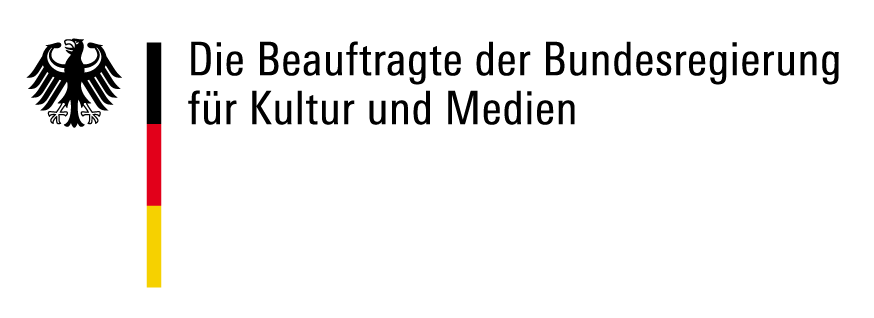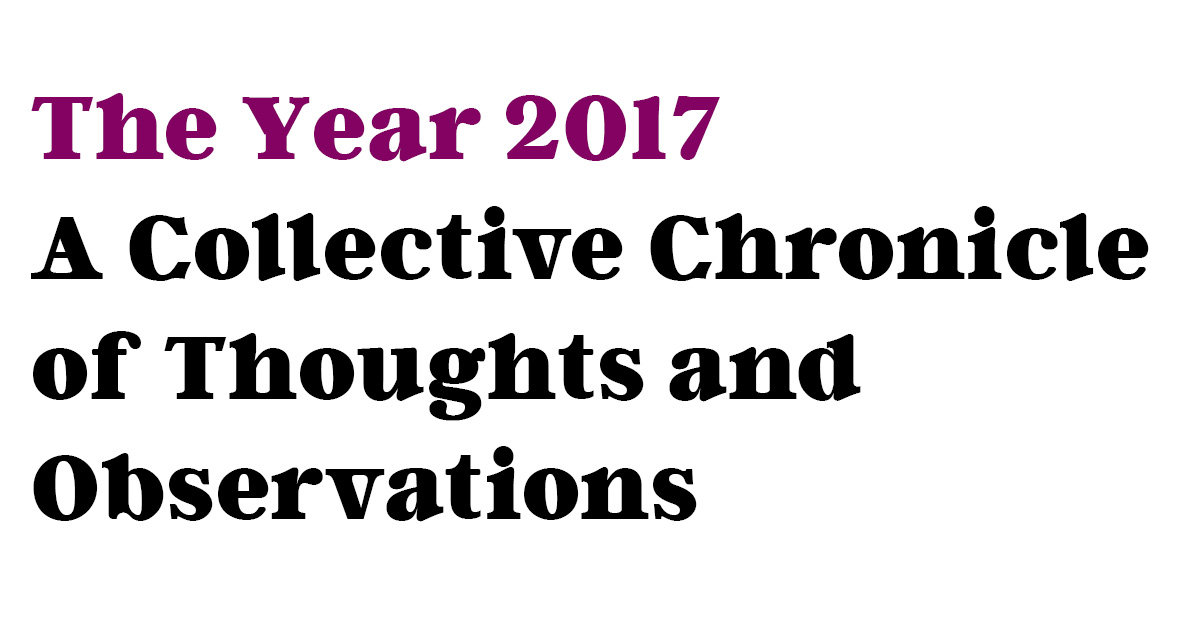FFT Düsseldorf
The Year 2017
A Collective Chronicle of Thoughts and Observations
Welcome to what is going to be a collective chronicle of the year 2017! This journal will follow the general change that we experience in our daily lives, in our cities, countries and beyond, in the political discourses and in our reflections on the role of artists and intellectuals. Originating from several talks and discussions with fellow artists and thinkers FFT feels the strong need to share thoughts and feelings about how we witness what is going on in the world. Week after week different writers, artists, thinkers and scientists will take the role of an observer as they contribute to this collective diary.
#13 March, 30th - April 2nd
Geert Lovink
Amsterdam
March 30, 2017
I am finishing a text on the Autonomous Fabric initiative, initiated by the Rotterdam Willem de Kooning art academy, in between meetings at the Hogeschool van Amsterdam where our Institute of Network Cultures is based. A few hundred young ‘creatives’ attended the Autonomous Fabric meeting in February. Their website, still under construction, is mapping the rich ecology of designers, programmers and visual arts collectives in Rotterdam, the Berlin of the Netherlands. The port city has lately been discovered by the International Hipsters Inc. Rotterdam is poor, rough, open, sexy, and most of all, deeply multi-cultural. Autonomous Fabric asks: how can emerging networks of precarious creative workers be protected and strengthened?
For me it is vital to what extend Rotterdam can learn from the Amsterdam mistakes, where gentrification takes command, and bankers, Airbnb, Uber and hotel chains are now running the show. Many have argued that, before the next financial crisis kicks in, the crippling anti-squatting laws in the Netherlands will have to be revoked and anti-squat offices will have to be closed. We need to demand, and realize, more social housing for young people and students. And occupy the soon empty hotels and offices. The exodus of young people needs to be reversed. More than anyone they have the right to city and will have to return subito, which is all but impossible with the current rents of 800-1000 euros a month for a simple room. Rotterdam will soon reach a fatal turning point, and this is why initiatives like Autonomous Fabric are so important. It is time to act, otherwise the social fabric will be torn to pieces.
My proposal is to set up organized networks (a concept I developed together with Ned Rossiter), and go for ‘strong ties’, not the ‘weak links’ that social media monopolies advocate. Organizing these days is a bit more than just setting up a Facebook groups page. In the end, it is irrelevant if the relevant people are up to date. We need to make an impact. Being visible is not enough. The social currency of ‘friends’ and followers (with ‘influencers’ as the new marketing avant-garde role models) may translate into profits for others but is not giving us access to the city. Autonomy implies self-organization, and that’s what it is all about. Connections are not enough. Only computers benefit from those. It’s also important to crack down on the romantic nonsense of ‘real meetings’. Politics is not about authentic experiences. It is about desires, demands, campaigns, struggles, victories and setbacks.
Valletta
March 31, 2017
This morning I travelled on Air Malta from Amsterdam to Valletta, which I am visiting for the first time, not to attend some EU meeting, but to teach at the European Graduate School. Last year, EGS opened a second campus on the island, after it was given EU accreditation here. The original location, high up in the Swiss Saas-Fee mountains, is known for its famous lectures by Jacques Derrida, Avital Ronell, Judith Butler, Wim Wenders and many more. Here I am teaching a class on critical internet culture, in which we discuss the rise of internet criticism since 2008 with authors such as Nicholas Carr, Andrew Keen, Sherry Turkle and Evgene Morozov. We also look at recent material from Douglas Rushkoff, Benjamin Bratton and rise of ‘platform capitalism’. Other items on the agenda are the aesthetics of search engines, experiments in digital publishing, internet revenue model in the arts (the MoneyLab network) and the inevitable critique of social media.
The group of students is small. I am a guinea pig, and I am perfectly aware of this. After a big launch last year with celebs, EGS is now starting its marketing campaign for its second location. Will it be able to expand with two campuses? While walking through Valletta, I discuss academic politics with Hubertus von Amelunxen, German media theorist of photography and EGS president since the departure of Schopenhauer expert Wolfgang Schirmacher who built up EGS. How can the local University of Malta experience the EGS low-residency model as an enrichment of Malta’s intellectual life, and not see it as a threat? Will specialized graduate degrees in the arts and humanities in Europe one day team up and beat the onslaught together? Last week the Hungarian Orbán government opened its attack on Soros Central European University. A bad sign of things to come, also for the EGS dwarf? Back to theory and philosophy as national folklore?
For critical internet research the situation is one of permanent precarity. Before we know those who question power will be phased out (yes, also in the internet context). The Media and Communication track inside EGS has already disappeared. Philosophers do not need the internet and have more important things on their mind. They dedicate themselves to eternal beauty, not to trivial matters. They read Heidegger (what else?). Soon we’re reaching a next stage of the ‘new normal’ in which everything digital disappears into the background as ‘the technological unconscious’ and is no longer talked about, like electricity, water and public transport: invisible infrastructures that manifests itself like the weather. Either it's there, or not. Either the sun shines or it rains. Internet as a given. For the time being Trump makes sure that internet architectures is back on the agenda. For how long? Breaking the neo-liberal consensus, politicizing the media, is not in the interest of Silicon Valley. Will Europe take this opportunity and fill the vacuum? No signs from Brussels, Paris and Berlin. Its old industrial policies are still in place, despite (or thanks to?) the glorifying of the ‘creative industries’ and the entrepreneurial ideologies. What lacks here is the evil Will to Power, a decisionist vision of the Chinese, to block others and build one’s own application industries.
Academic politics aside, what’s really on my mind on this Sunday morning is a topic that occupies millions of online teenagers: Google’s latest auto-demonitization policies against popular (read: right-wing populist) YouTubers that raise sensitive issues. Look at this video. How many of the mega famous YouTubers will survive this change in policy? It is hard not to read it as a sweet revenge of the politically correct Silicon Valley class, that is deeply upset about the election of Trump in the White House and takes it out on the trolls, the incorrect youngsters and other irregulars that Google first trained, then made famous, benefitted from in a massive way, and is now trying to get rid off.

Location of the second campus of the European Graduate School, St. Almo, Valletta (Malta)
Valletta
April 2, 2017
In between preparing classes I finished The Question Concerning Technology in China—An Essay in Cosmotechnics, the second book of Berlin-based Hong-Kong philosopher Yuk Hui. Over the summer I read his extended PhD thesis, a philosophical enquiry on the essence of the ‘digital objects and metadata schemes’ and made an interview with him for e-flux. I was interested in the ‘China and technology’ topic as my latest book Social Media Abyss (dt. Im Bann der Plattformen, Transcript Verlag, 2017) appears in Chinese this spring, my first translation in Mandarin. Last time I met Yuk Hui was last November in Hangzhou at the first conference of the brand new Institute of Network Society, a small research initiative inside the Chinese Academy of the Arts. To cut a long story short, I have not been a big fan of the Chinese Communist Party, including their national firewall approach. This is why I shied away from contact with officials but this time friends convinced it was fine and the arts context convinced me that I had to go for it. Yuk Hui doesn’t deal with Communist five-year plans but asked the question why there is no Chinese philosophy of technology as we know it in the West.
Hui’s title is an obvious reference to Heidegger’s 1954 Die Frage nach der Technik essay, which plays a central role in this book, together with the work of Simondon and Stiegler. Hui asks if Chinese culture will be able to decouple technology from (Western) modernity. Can we use computers without losing our roots? “Modernization is fundamentally a transformation, if not a destruction, of the moral cosmology that is expressed in every form of art in China, from tea ceremonies to calligraphy, from craftsmanship to architecture.” As China has caught with the West, and is now on the same technological time-axis as West, what lags behind, is Chinese thought. But do we need Heidegger for that? That was my question. If the Chinese past is not going to give us satisfying conceptual tools to deal with today’s challenges (as Hui seems to suggest), then there’s huge task for the millions of young Chinese intellectuals, artists, programmers and designers to fill up this vacuum. To turn these talents into tourists and send them off to Todtnauberg is not the answer.
Over the past decade Yuk Hui himself has made an interesting journey through Europe. Starting off at Goldsmith in London where he did his PhD, he then moved to Paris to work with Bernard Stieger at IRI (inside the Pompidou Centre) and then moved to Berlin to work as a postdoc at the Leuphana university (in Lüneburg). It will be interesting to see where he moves next. Maybe it’s time to say farewell to Europe and take up the challenge Hui put on the table to start with the actual design of a Chinese philosophy of technology, in Asia itself. The obstacles are known. Will Hui’s generation be able to overcome the political and institutional restraints and build up its own school of thought? Let world history judge. The urgency is there. And if the institutions aren’t ready for it, can philosophy disguise itself as NGO, literary criticism or even as a startup?
Geert Lovink is a media theorist, internet critic and author of Dark Fiber (2002), Zero Comments (2007), Networks Without a Cause (2012) and Social Media Abyss (2016). Since 2004 the coordinator of the Institute of Network Cultures at the Hogeschool van Amsterdam.
www.networkcultures.org
#1 January 1st - 8th Jacob Wren
#2 January 9th - 15th Toshiki Okada – japanese version
#3 January 16th - 22nd Nicoleta Esinencu – romanian version
#4 January 20th - 30th Alexander Karschnia & Noah Fischer
#5 January 30th - February 6th Ariel Efraim Ashbel
#6 February 6th - 12th Laila Soliman
#7 February 13th - 19th Frank Heuel – german version
#9 February 26th - March 5th Gina Moxley
#10 March 6th - 12th Geoffroy de Lagasnerie – version française
#11 March 13th - 19th Agnieszka Jakimiak
#12 March 20th - 26th Yana Thönnes
#13 March 30th - April 2nd Geert Lovink
#14 April 3rd - 9th Monika Klengel – german version
#15 April 10th - 16th Iggy Lond Malmborg
#16 April 17th - 23rd Verena Meis – german version
#17 April 24th - 30th Jeton Neziraj
#20 May 15th - 21st Bojan Jablanovec
#21 May 22nd - 28th Veit Sprenger – german version
#22 May 29th - June 4th Segun Adefila
#23 June 5th - 11th Agata Siniarska
#25 June 19th - 25th Friederike Kretzen – german version
#26 June 26th - July 2nd Sahar Rahimi
#27 July 3rd - 9th Laura Naumann – german version
#28 July 10th - 16th Tom Mustroph – german version
#29 July 17th - 23rd Maria Sideri
#30 July 24th - 30th Joachim Brodin
#33 August 14th - 20th Amado Alfadni
#35 August 28th - September 3rd Katja Grawinkel-Claassen – german version
#38 September 18th - 24th Marcus Steinweg
#43 October 23rd - 29th Jeannette Mohr
#44 May/December Etel Adnan
#45 December 24th - 31st Bini Adamczak
#21 May 22nd - 28th Veit Sprenger – german version
10.6. #future politics No3 Not about us Without us FFT Juta
Geoffroy de Lagasnerie Die Kunst der Revolte
21.1. #future politics No1 Speak TRUTH to POWER FFT Juta
Mark Fisher
We are deeply saddened by the devastating news that Mark Fisher died on January 13th. He first visited the FFT in 2014 with his lecture „The Privatisation of Stress“ about how neoliberalism deliberately cultivated collective depression. Later in the year he returned with a video-lecture about „Reoccupying the Mainstream" in the frame of the symposium „Sichtungen III“ in which he talks about how to overcome the ideology of capitalist realism and start thinking about a new positive political project: „If we want to combat capitalist realism then we need to be able to articulate, to project an alternative realism.“ We were talking about further collaboration with him last year but it did not work out because Mark wasn’t well. His books „Capitalist Realism“ and „The Ghosts of my Life. Writings on Depression, Hauntology and Lost Future“ will continue to be a very important inspiration for our work.
Podiumsgespräch im Rahmen der Veranstaltung "Die Ästhetik des Widerstands - Zum 100. Geburtstag von Peter Weiss"
A Collective Chronicle of Thoughts and Observations ist ein Projekt im Rahmen des Bündnisses internationaler Produktionshäuser, gefördert von der Beauftragten der Bundesregierung für Kultur und Medien.

